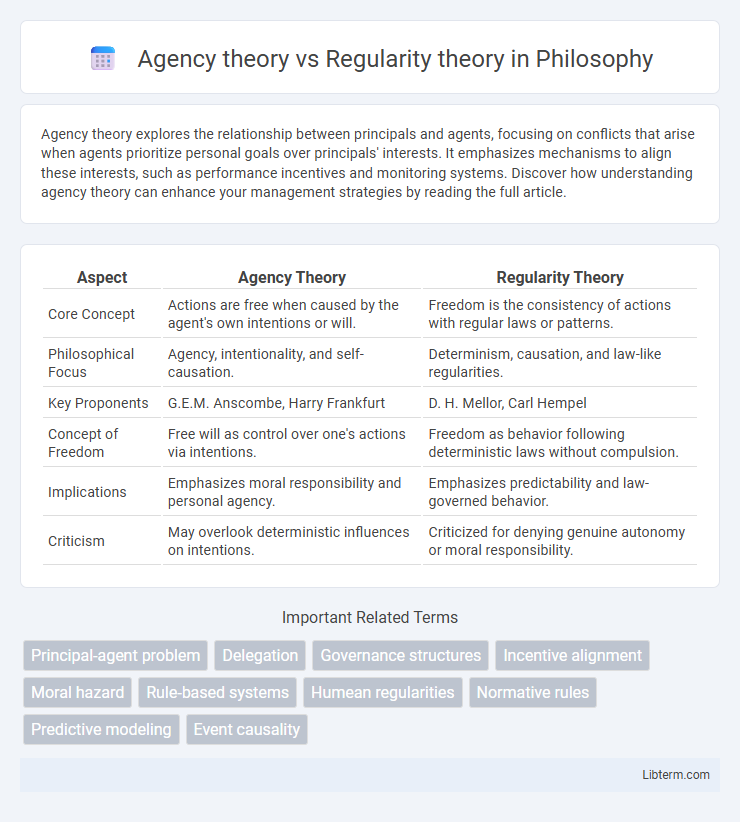Agency theory explores the relationship between principals and agents, focusing on conflicts that arise when agents prioritize personal goals over principals' interests. It emphasizes mechanisms to align these interests, such as performance incentives and monitoring systems. Discover how understanding agency theory can enhance your management strategies by reading the full article.
Table of Comparison
| Aspect | Agency Theory | Regularity Theory |
|---|---|---|
| Core Concept | Actions are free when caused by the agent's own intentions or will. | Freedom is the consistency of actions with regular laws or patterns. |
| Philosophical Focus | Agency, intentionality, and self-causation. | Determinism, causation, and law-like regularities. |
| Key Proponents | G.E.M. Anscombe, Harry Frankfurt | D. H. Mellor, Carl Hempel |
| Concept of Freedom | Free will as control over one's actions via intentions. | Freedom as behavior following deterministic laws without compulsion. |
| Implications | Emphasizes moral responsibility and personal agency. | Emphasizes predictability and law-governed behavior. |
| Criticism | May overlook deterministic influences on intentions. | Criticized for denying genuine autonomy or moral responsibility. |
Introduction to Agency Theory and Regularity Theory
Agency theory explores the relationship between principals and agents, emphasizing the conflicts of interest and information asymmetry that arise when agents act on behalf of principals. Regularity theory, on the other hand, focuses on the consistent and predictable patterns of events without assuming causal necessity, highlighting the importance of observable regularities in explaining phenomena. Understanding these foundational concepts allows for a deeper analysis of decision-making processes in economics and organizational behavior.
Defining Agency Theory: Key Principles
Agency theory defines the relationship between principals and agents, emphasizing the delegation of decision-making authority and the conflicts arising from differing goals. Core principles include information asymmetry, where agents possess more information than principals, and incentive alignment to mitigate risks of moral hazard and adverse selection. This theory underscores contract design and monitoring mechanisms to ensure agents act in the principals' best interests.
Understanding Regularity Theory: Core Concepts
Regularity theory centers on the consistent, observable correlation between events, emphasizing patterns rather than causal explanations. It holds that laws of nature are descriptions of regularities in the world, relying on repeated experiences as the foundation for understanding phenomena. This theory contrasts with agency theory, which focuses on intentional actions and decision-making processes of agents influencing outcomes.
Historical Development of Both Theories
Agency theory emerged in the 1970s through the work of Michael Jensen and William Meckling, focusing on the relationship between principals and agents in economic contexts. Regularity theory, rooted in the philosophy of science by Carl Hempel and others in the mid-20th century, emphasizes the identification of consistent patterns or regularities in phenomena to explain laws of nature. The historical development of agency theory highlights its origins in economic and organizational studies, while regularity theory traces back to philosophical efforts to understand scientific explanation and law formation.
Major Differences Between Agency and Regularity Theories
Agency theory emphasizes the relationship between principals and agents, focusing on resolving conflicts arising from differing goals and asymmetric information. Regularity theory, on the other hand, centers on the behavior and compliance with established norms or rules, prioritizing predictability and consistency in actions over interpersonal dynamics. The major difference lies in agency theory's focus on contractual relationships and incentive alignment, while regularity theory stresses adherence to regular patterns and systemic order.
Applications of Agency Theory in Business and Economics
Agency theory is widely applied in business and economics to address conflicts of interest between principals, such as shareholders, and agents, like company executives, ensuring alignment through incentive structures and monitoring mechanisms. It informs corporate governance, helping design contracts that mitigate risks associated with information asymmetry and moral hazard. The theory is also instrumental in financial management, influencing executive compensation, risk management strategies, and organizational decision-making processes.
Regularity Theory in Law and Philosophy
Regularity Theory in law and philosophy asserts that legal rules derive their authority from consistent and repeated application, emphasizing predictability and uniformity in legal decisions. This theory contrasts with Agency Theory by focusing on observed patterns of behavior and established customs rather than relationships of delegation or control. Regularity Theory supports the idea that laws function effectively when they reflect regular practices and societal norms, ensuring stability and coherence in the legal system.
Strengths and Limitations of Agency Theory
Agency theory excels in explaining relationships where one party (the agent) acts on behalf of another (the principal), highlighting conflicts of interest and methods to align incentives through contracts and monitoring. Its strength lies in addressing issues of information asymmetry and risk-sharing in corporate governance and management. Limitations include assumptions of rational behavior and self-interest, often overlooking social, ethical, and emotional factors influencing decision-making.
Strengths and Limitations of Regularity Theory
Regularity theory excels in providing a clear, observable framework for understanding causation by emphasizing consistent correlations between events, which simplifies empirical analysis and supports scientific inquiry. However, its limitation lies in failing to account for underlying mechanisms or necessary connections, often leading to misinterpretation of mere correlations as causal relationships. This weakness restricts its application in complex systems where causality involves more than repeated regularities, necessitating complementary theories for a comprehensive understanding.
Comparative Analysis: Which Theory Fits Your Context?
Agency theory emphasizes the relationship between principals and agents, focusing on resolving conflicts of interest and ensuring that agents act in the principals' best interests through mechanisms like contracts and incentives. Regularity theory, rooted in the philosophy of law, views legal rules as patterns of behavior consistently followed by officials, prioritizing predictable enforcement over individual motivation or contractual relationships. Selecting the right theory depends on the context: agency theory suits corporate governance and organizational management where alignment of incentives matters, while regularity theory applies better to legal and institutional settings emphasizing rule-following and systemic consistency.
Agency theory Infographic

 libterm.com
libterm.com